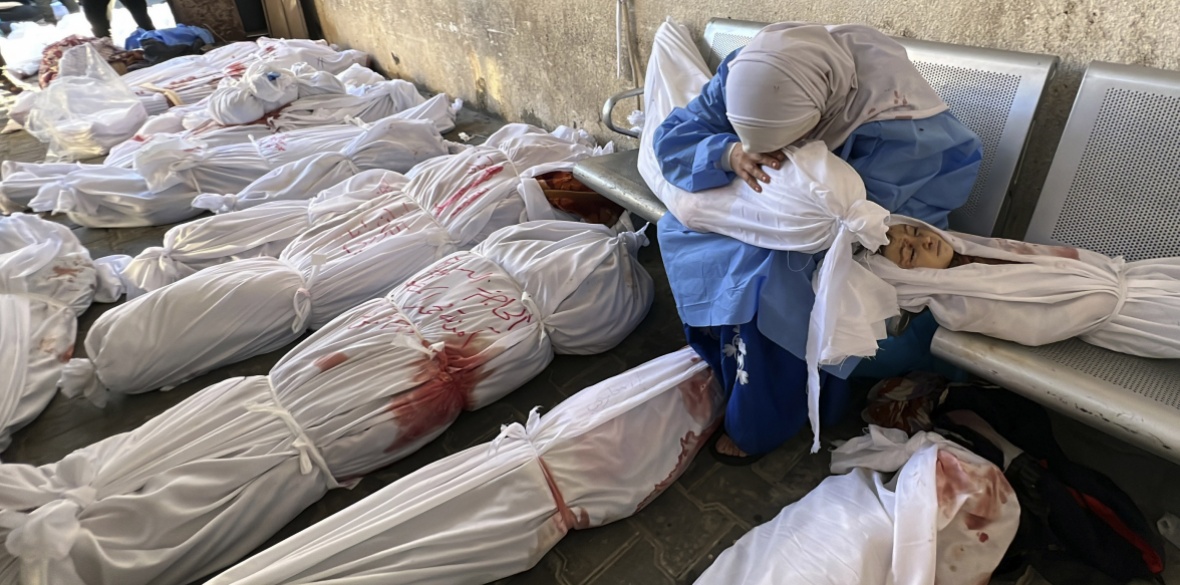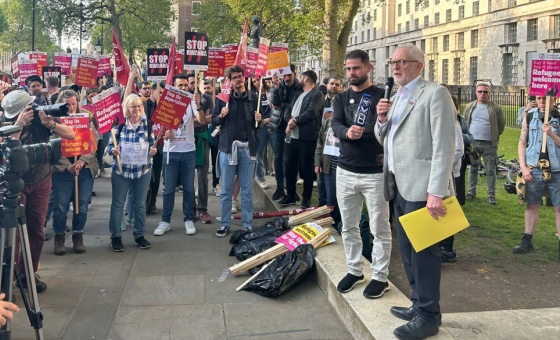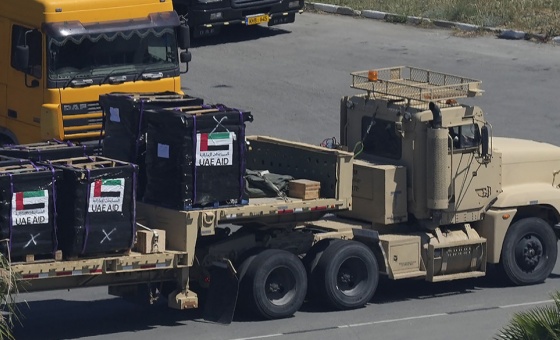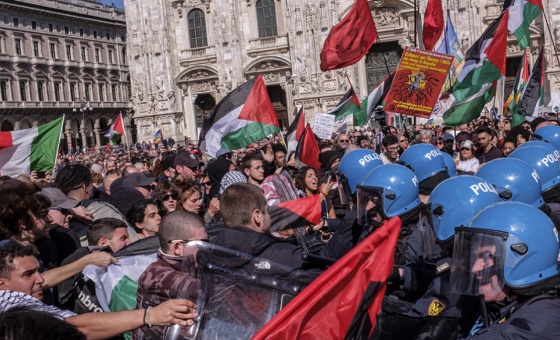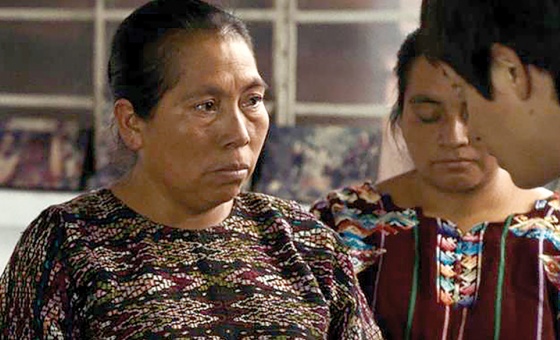This is the last article you can read this month
You can read more article this month
You can read more articles this month
Sorry your limit is up for this month
Reset on:
Please help support the Morning Star by subscribing here
HEAVY fighting broke out around another hospital in Gaza today as Israel continues to collectively punish the Palestinian people.
This comes as Israeli forces expanded their retaliation to the October 7 Hamas uprising by targeting the occupied West Bank.
In northern Gaza, a shell struck the Indonesian Hospital, where thousands of patients and displaced people have been sheltering for weeks, killing at least 12 people, according to the Gaza Health Ministry.
Speaking by phone, Marwan Abdallah, a medical worker at the hospital, said Israeli tanks were operating less than 200 yards away from the site, and that Israeli snipers could be seen on the roofs of nearby buildings.
Mr Abdallah said the hospital had received dozens of dead and wounded in air strikes and shelling overnight.
He said medical staff and displaced people fear Israel will besiege the hospital and force its evacuation.
Health Ministry spokesman Ashraf al-Qidra, who is now based in southern Gaza, said some 600 patients, 200 healthcare workers and 2,000 displaced people were sheltering there.
Reporting from inside the hospital for Al Jazeera shortly after the Israelis began their assault, journalist Anas Al Sharif said: “Israeli war planes and artillery deliberately pounded the hospital. Victims are piling up on the floor.
“Any moving target within or outside the hospital is a target for Israeli snipers.”
He added: “This is evidence of yet another Israeli war crime.”
Israeli authorities claim Hamas have hidden command centres beneath hospitals.
The Israeli military released a video on Sunday showing what it said was a tunnel discovered at the hospital, 54 metres long and about 30 metres below ground. The claim has not been independently verified.
Another Al Jazeera journalist, Hani Mahmoud, reported that Khan Younis in the south of Gaza, where Palestinians were ordered to move for safety, was also being bombed.
Peace campaigners CND tweeted today that “the majority of the public want a ceasefire.”
They added: “The voices for peace aren’t going anywhere,” and urged everyone to join the next national demonstration for a ceasefire on November 25.
Labour leader in Scotland, Anas Sarwar, signalled a clear break with his Westminster counterpart, Sir Keir Starmer, by saying that the party’s MSPs will vote for an immediate ceasefire in a vote in the Scottish Parliament on Tuesday.
But geo-political analyst Fiorella Isabel pointed out today that “Gaza’s children are not only dying from Israel’s incessant carpet bombing — but also from starvation caused by Israel cutting them off from food, water, medicine and electricity.”
The blockade imposed by Israel means there is no fuel to power the generators needed to treat patients or to get desperately needed food and medical supplies into Gaza.
Last week, the United Nations warned that Gaza was on the verge of a horrific famine.
The attack on the Indonesian Hospital came a day after the Palestinian Red Crescent Society and the World Health Organisation succeeded in evacuating 31 premature babies from Al-Shifa Hospital in Gaza City, the territory’s largest, where they were among more than 250 critically ill or wounded patients stranded there days after Israeli forces entered the compound.
Some 1.7 million people, nearly three-quarters of Gaza’s population, have been displaced, with 900,000 packing into crowded UN-run shelters, according to the organisation.
Nearly 13,000 Palestinians, including more than 5,000 children, have been killed in Gaza, according to the Palestinian Health Ministry in the West Bank. Officials there say another 4,000 are missing and believed buried in rubble.
On the Israeli side around 1,200 have been killed, mainly on October 7.
But as global attention is focused on the besieged Gaza Strip, Israeli settler violence against the Palestinians has been ramped up in the occupied West Bank.
According to the UN there has been an unprecedented increase in raids on refugee camps, bulldozers destroying roads, violence against farmers and the burning of olive trees and Palestinian properties.
“Our lives are hell,” said Sabri Boum, a farmer who fortified his windows with metal grills last week to protect his children from settlers he said threw stun grenades in Qaryout, a northern village.
“It’s like I’m in a prison.”
Palestinians who’ve endured hardships of Israeli military rule, now in its 57th year, say this war has left them more vulnerable than ever.
“We’ve become scared of tomorrow,” said Abdelazim Wadi, whose brother and nephew were fatally shot by settlers, according to health authorities.
In six weeks, settlers have killed nine Palestinians, health authorities said.
They have also destroyed 3,000-plus olive trees during the crucial harvest season, said Palestinian Authority official Ghassan Daghlas, wiping out what for some were inheritances passed through generations.
And they've harassed herding communities, forcing over 900 people to abandon 15 hamlets they long called home, the UN said.
When asked about settler attacks, the Israeli army said only that it aims to defuse conflict and troops “are required to act” if Israeli citizens violate the law.
The settlers appear to be operating without fear of any repercussions from Israeli authorities.
Israeli rights group, Yesh Din, said that since October 7 only one settler has been arrested and was released five days later.
They added that two other settlers were placed in preventive detention without charge.
Naomi Kahn, of advocacy group Regavim, which lobbies for settler interests, argued that settler attacks weren’t nearly as widespread as rights groups report, and that the “entire Israeli system works not only to stamp out this violence but to prevent it.”
Before the Hamas uprising, 2023 already was the deadliest year for Palestinians in the West Bank in over two decades, with 250 Palestinians killed by Israeli fire.
Over these six weeks of war, Israeli security forces have killed another 206 Palestinians, the Health Ministry said, the result of a rise in army raids backed by airstrikes and Palestinian militant attacks.
In the deadliest West Bank raid since the second Palestinian intifada of the 2000s, Israeli forces killed 14 Palestinians in the Jenin refugee camp on November 9.

